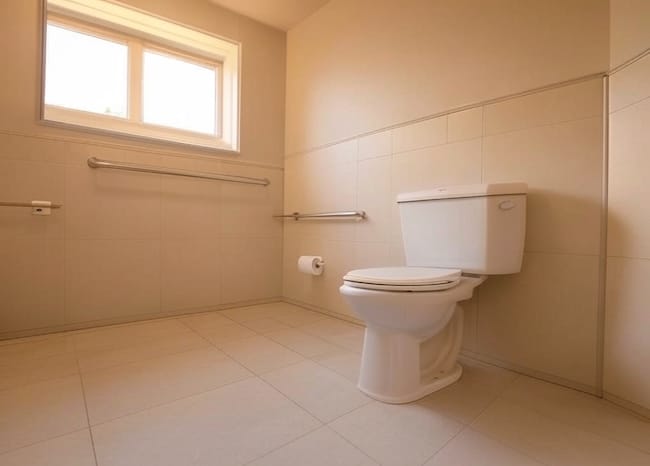Constipation is an uncomfortable reality for nearly 50% of seniors, often caused by medications, dehydration, or reduced mobility. While frustrating, many cases can be relieved with simple, home-based solutions.
In this guide, we share six gentle, doctor-approved remedies to help your loved one find relief, from hydration tricks to movement exercises that stimulate digestion. These approaches are safe, effective, and can make a noticeable difference without harsh laxatives.

Constipation is an issue that many older adults deal with regularly, and this chronic digestive discomfort can seriously affect your loved one's life. Let's look at what the experts say about constipation in seniors and what to do about it.
Chronic Constipation is a Common Issue for Older Adults
Constipation can cause older adults not to want to eat or exercise, making them cranky and uncooperative.
It could also cause unwanted behavior in people with Alzheimer’s or dementia, such as taking off their incontinence briefs at inappropriate times.
To help older adults get relief, we found an article from The New York Times that shares useful tips for safely and gently relieving chronic constipation at home.
The tips are based on research by Dr. Arnold Wald, a gastroenterologist at the University of Wisconsin School of Medicine and Public Health.
We highlight the points from the article that are most useful for caregivers and cover why chronic constipation in seniors is so common, what constipation is, six effective home remedies for chronic constipation, and when it’s necessary to see the doctor.
Why is Chronic Constipation Common in Seniors?
Older adults are more likely to have chronic constipation because of:
- Side effects from medications like opiates for pain (Percocet, Oxycontin, Norco), antidepressants, anticonvulsants, and antihistamines
- Medical conditions like strictures, tumors, Parkinson’s disease, or low thyroid
- Slowing or weakening of the digestive system due to aging or frailty
What’s the Medical Definition of Constipation?
Contrary to popular belief, you don’t have to have a bowel movement every day to be considered regular.
But going more than three days without a bowel movement is too long. By then, the stool has become more challenging to pass.
Constipation symptoms include:
- Few bowel movements
- Trouble having a bowel movement (straining)
- Small or hard stools
- Feeling like everything didn’t come out
- Swollen abdomen or abdominal pain
- Vomiting

6 Effective Home Remedies For Chronic Constipation In Seniors
Constipation can often be solved with these six simple home remedies.
But if the situation doesn’t improve soon, it’s essential to speak to their doctor if one's constipation is a symptom of a more serious health condition.
1. Avoid constipating foods like:
- White rice and other refined grains
- Unripe bananas
- Tea
- Cheese
- Chocolate
2. Regularly eat (and drink) foods like:
- Beans
- Whole grains, especially bran
- Vegetables
- Fresh and dried fruit
- Nuts
- High-fiber foods
- Water — softens stool and stimulates the bowel
Important: If a doctor says that a person's nerve or muscle problem causes constipation, they may recommend that an older adult eat less fiber and use medication that adds water to the colon to soften stool.
3. Exercise regularly and as vigorously as possible
Exercise and regular physical activity are great for overall health, so it’s no surprise that they also help regulate the digestive system.
4. Establish a regular bathroom time and also respond immediately to the urge to go
Having a daily routine where your older adult at least “tries” to go simultaneously every day is a good idea.
But anytime they feel the urge, they should still go immediately.
5. Take a daily soluble fiber supplement
Add a soluble fiber supplement, such as Benefiber or Metamucil, to your beverages.
Today’s formulas are easier to take because they dissolve entirely, aren’t gritty, and don’t thicken beverages. They also come in flavorless options that can be added to any beverage.
Important: If a doctor says that a nerve or muscle problem causes constipation, they may recommend that your older adult eat less fiber and use medication that adds water to the colon to soften stool.
6. Use laxatives properly
Dr. Wald’s research showed that long-term use of stimulant laxatives like Senokot or Dulcolax shouldn’t harm the colon or cause dependence if they’re used in recommended amounts.
Of course, your loved one's doctor must approve the laxative, recommend an appropriate dose, and continue to monitor as long as they take it.

When to see the doctor about constipation
Don’t hesitate to discuss frequent or ongoing constipation with your doctor.
And if you’ve tried a combination of dietary changes, exercise, and over-the-counter remedies and your loved one isn’t getting any relief, see the doctor to rule out other medical conditions.
Recommended for you:
- 6 Ideas to Get Seniors to Drink More Water
- Dehydration in Elderly Is a Serious Health Risk
- 3 Top Benefits of a Daily Routine for Seniors
This article may contain affiliate links. We never link to products or services for the sole purpose of making a commission. For more information, see How We Make Money.
About the Author

Connie Chow
Connie was a hands-on caregiver for her grandmother for 20 years. (Grandma made it to 101 years old!) She knows how challenging, overwhelming, and all-consuming caring for an older adult can be. She also knows how important support is — especially in the form of practical solutions, valuable resources, and self-care tips.






My 90-year-old mother can no longer walk and is basically bedridden. There are times when her bowel will not pass until 7-8 days. What home remedy can we use to help it along? We have tried the “blow out system” prune juice, MiraLAX and laxative. Please help!
How about constipation and Alzheimer’s? …..what to do when the need to go is not recognized in time or at all?
With someone who has Alzheimer’s or dementia, it’s best to establish a regular schedule for using the bathroom. Over time, that helps their body get used to going at those regular times. More info here – Why a Daily Routine Is Important for Seniors: 3 Top Benefits https://dailycaring.com/why-routine-is-important-for-seniors/
This can also help avoid accidents because you no longer rely on the person to know that they need to use the bathroom. With cognitive impairment, the person may no longer be aware of this need.
To help with constipation, we hope the suggestions in this article above are helpful.
Every person is different. When trying to figure out what is causing the problem – ask the person! Someone who had a normal pattern of 1x/week when active healthy and middle-aged is not going to convert to every 3rd day.
What did the person do in the past when they couldn’t pass BM?
Sometimes the answer is as simple as stewed prunes or prune juice, warm milk with blackstrap molasses, etc. It might seem ‘weird’ or ‘gross to us, but trying it out to see if it is effective is a good step.
Often the urge to move bowels comes about 30-60 minutes after a meal, and is strongest in the morning. High fiber cereal with fruit, hot coffee, OJ with pulp, and then moving to the toilet when the urge hits is what you need.
People often ‘hold it’ if they are getting ready to go out in the car, or the aide arrives to help with a shower, or. not wanting to leave odor in the bathroom.
Try to see if these behaviors are factors.
These are all non medical interventions.
Thanks for sharing your suggestions!
I just learned about the over dose of magnesia and long term kidney damage. Even though I have confidence in my primary doctor, I’m sure that his point of view may be biased possibly with a limited knowledge or exposure like a research chemist.
If some expert has a magic answer or pill, it can rival the atom bomb for the entire world!!! We need another Einstein or Madam Curie!!!!!!!!!!
if
It’s essential to speak with your doctor to find out if a specific medication, whether it’s over-the-counter or prescription, is helpful and how long it can be used for. If you’re concerned about your doctor’s recommendation, you might want to see another physician to get a second opinion.
Generic dulcalux works for me by taking 2 little pills and expect results in about 12 hours. Usually I can expect results for the next day as well from the 2 pills.
I’m very concerned about long term liver damage. I usually take 2 pills about twice a week
I took Mira lux years ago (I’m 94 now) and tried it mixed with food and did not like it or the taste.
It’s important to speak with your doctor to find out if a specific medication, whether it’s over-the-counter or prescription, is helpful and how long it can be used for. Each person’s body and health conditions are different, so your doctor would be the best person to advise you on a safe long-term treatment.
Why put an older person on medication when magnesium citrate caps or liquid (without additional additives!) works well for the majority of healthy seniors? Stewed prunes as well. Don’t complicate things or create new problems with the side effects of medicines…
Adding a magnesium supplement is similar to adding a medication. The doctor would need to be consulted ahead of time to make sure it wouldn’t interact negatively with any existing medications or chronic health conditions.
In some cases, if making all possible lifestyle changes doesn’t work for someone’s specific health condition, a doctor-supervised medication may be necessary.
Some older seniors already incorporate every item you mentioned in their daily regimen and still have constipation issues where they can’t move their bowels for days at a time. And even though hypermagnesemia is rare (normally functioning kidneys filter out excess magnesium), it is common for older seniors to have impaired kidney function to one degree or another. Some OTR laxatives can have high amounts of magnesium…just have to aware of the overall picture on a case by case basis.
Yes, as recommended in the article, it’s essential to get advice from a doctor before taking any medications, whether over-the-counter or by prescription. And, if lifestyle and diet changes aren’t helping the situation, it’s important to speak with the doctor to get their recommendation.
good. I want innovation in constipation redy
cronic constipation. age 68 .
We hope the suggestions above will be helpful in relieving the constipation.
I took a Dulcolax laxative pill and nothing happened. The pill had expired 6 months ago. Is that the cause ? Should I try a different laxative? I’m usually successful with Dukcolax stool softener with mild laxative but I have to take 2 for it to work any recommendations?
The best thing to do is to call your doctor to get their advice. We’re not doctors or medical professionals, so unfortunately we aren’t able to provide any specific recommendations.